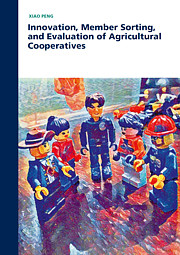Innovation, member sorting, and evaluation of agricultural cooperatives Defended on Thursday, 26 January 2017
This dissertation aims to extend the current understanding of the agricultural cooperatives, and it is done by executing three studies regarding various aspects of the cooperatives.
First study
investigates the relationship between communication, innovation, and (de)centralization in cooperatives. This study claims that the communication between members is related to process innovation, while the communication between managers and members is related to product innovation. The adopted (de)centralization depends on the two types of communication costs.
Second
, a sorting model is developed to examine how members sort themselves across enterprises and which governance structures are adopted. A cooperative pays a uniform price to all farmers to maximize members’ revenue and retains no profits, whereas investor-owned firm differentiates payments based on quality. The model shows that the farmers tend to choose the neighboring enterprise, and the farmers with high quality products tend to choose an investor-owned firm. Besides, the higher the quality payment, the more farmers are attracted by the investor-owned firm, and it has an impact on the market structure.
Last,
this dissertation provides evidence from China for a better understanding of the different evaluations between CEOs and members, therefore helps CEOs to best serve the membership of the cooperatives. The survey shows that members have higher scores than CEOs regarding member profitability and overall performance, while CEOs have a higher evaluation regarding social influence. Moreover, the associated factors that may influence the evaluations are explored.








